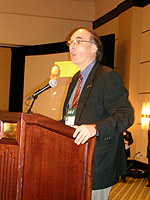Wi3: Shop Local 'Dream Team' Discusses Localism Movement in America
 Beginning with optimism and ending with a standing ovation from the approximately 500 attendees, the Winter Institute keynote discussion on Shop Local and related movements was a fascinating overview about the importance of building alliances among locally owned independent businesses and changing consumers' mindsets regarding the importance of a healthy local economy.
Beginning with optimism and ending with a standing ovation from the approximately 500 attendees, the Winter Institute keynote discussion on Shop Local and related movements was a fascinating overview about the importance of building alliances among locally owned independent businesses and changing consumers' mindsets regarding the importance of a healthy local economy.
Participating in the discussion were Bill McKibben, author of Deep Economy: The Wealth of Communities and the Durable Future (Holt Paperbacks); Stacy Mitchell, author of Big Box Swindle: The True Cost of Mega-Retailers and the Fight for American's Independent Businesses (Beacon) and senior researcher for the Institute for Local Self-Reliance; and Michael Shuman, author of The Small-Mart Revolution: How Local Businesses Are Beating the Global Competition (Berrett-Koehler), vice president of enterprise development for the Training & Development Corporation, and co-founder of the Business Alliance for Local Living Economies.
 Oren Teicher |
Recognizing the depth of experience of the panelists, moderator Oren Teicher, ABA COO, dubbed them the movement's "dream team," and in an engaging and, often, funny hour-long discussion, the three presented a persuasive brief in support of optimism and engagement set against a backdrop showing the serious consequences of inaction.
In introducing the speakers, Teicher shared some brand new statistics and data about Shop Local/Sustainable/Independent Business Alliance efforts across the country. He highlighted how those communities with existing Shop Local campaigns had better holiday sales results than those communities without. (To see a related story on this study, click here.)
All three speakers cited the recent progress that local business alliances and other related organizations have made. "There's more to be optimistic about than there was five years ago.... There's a lot of activity out there," said Mitchell.
"I'm really upbeat," concurred Shuman, who pointed to a 2007 Time magazine piece on the local food movement as a bellwether of a shift in consumer values. "It shows there is a brand affiliated ... with local economies that people are embracing."
McKibben stressed that no segment of our society would be able to ignore "the inescapable logic of a world that isn't going to be able to depend on the burning of fossil fuel," adding that "a big box store is just a machine for global warming."
 Bill McKibben |
But if, as McKibben put it, "the course of history is in your favor," booksellers, he said, also faced a unique responsibility. Noting that the number of Americans who said that they are "very happy" with their lives peaked in the mid-1950s, McKibben argued that the dwindling number of social connections and a loss of community have resulted in people reporting that "they have half as many close friends as they did 50 years ago."
Mitchell noted that studies have shown that counties with a predominance of small businesses score better on social welfare measures (with lower crime rates and higher incomes, for instance) and that residents of these counties belonged to more civic organizations and voted more often.
 Stacy Mitchell |
"People are hungry for more meaning in their lives, and you are the purveyors of meaning," said McKibben, who described bookstores as "a hub for helping people understand the world."
Because of the centrality of bookstores within their communities, booksellers were uniquely positioned to take leadership roles in establishing and leading local business alliances, all three panelists agreed. Bookstores are "a place for getting people to think.... You are at the cutting edge," said Shuman, who noted that "that bookstores have been at the forefront, if not the leaders" in establishing successful independent business alliances in such cities as Bellingham, Washington, and Austin, Texas.
 Michael Shuman |
Describing the successful passage of the "Informed Growth Act" in Maine last year, Mitchell cited the political clout of the state's independent business owners, who lobbied on behalf of the bill, which calls for cities to conduct an economic impact analysis for proposed stores larger than 75,000 square feet. She noted that approximately 200 business owners wrote their state legislators in support of the bill and many testified in its favor. That participation "completely changed the political climate for the bill... and, suddenly, we had bipartisan support," she said.
Similarly, Teicher detailed the role independent booksellers played in significantly changing the online retail landscape in New York State. In January, Governor Eliot Spitzer proposed a budget that would clarify the nexus status of online retailers selling to New York residents and require those retailers to collect sales tax. The move came after many independent booksellers in the state had written the governor urging him to fairly enforce state sale tax laws. "You can't underestimate how much influence something as simple as sending a letter on tax reform to your governor can be," said Mitchell. --Dan Cullen

